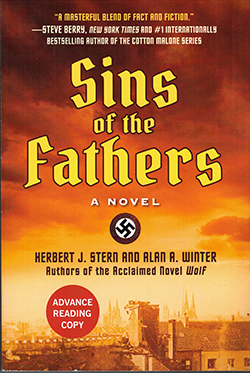Sins of the Fathers: A Novel by Herbert J. Stern and Alan A. Winter; Skyhorse Publishing Inc. © 2022; ISBN 9781510-769427; 432 pages, $29.99.
By Donald H. Harrison

 SAN DIEGO – Here is a mixture of history, biography, and pure fiction depicting the political maneuvering of Adolf Hitler and the people closest to him between 1934 and 1938, the tumultuous years preceding World War II.
SAN DIEGO – Here is a mixture of history, biography, and pure fiction depicting the political maneuvering of Adolf Hitler and the people closest to him between 1934 and 1938, the tumultuous years preceding World War II.
The novel is a sequel to Stern’s and Winter’s Wolf, which told of Hitler’s earlier life. Both are narrated by the fictional Friedrich Richard, who supposedly came through World War I with Hitler, aided him in the failed Beer Hall Putsch in 1923, and thereafter remained one of his closest confidants.
Unbeknown to Hitler, Richard has become appalled by der fuehrer’s recklessness, paranoia, racism, and antisemitism. An urbane man, he secretly meets with German military leaders to plan a coup d’etat, even as Hitler scores dizzying (and terrifying) successes rearming his country in violation of the Versailles Treaty, forcing union (Anschluss) with Austria, and taking over German-speaking portions of Czechoslovakia.
We watch Hitler glory in the adulation accorded him at the 1936 Olympics, accompany him to his Bavarian mountain hideaway at Berchtesgaden, and sit with the fictional Richard as an observer at the Evian Conference in France, where countries gave lip service to the plight of refugees (read that European Jews) while declining to increase their quotas. This inaction delighted Hitler, who said it proved no one wanted Jews, so Germany must find its own way to deal with them.
Although the book runs over 400 pages, it is fast moving and it is leavened by the humanitarianism of Richard and his girlfriend Carla, a talented photographer. We also glimpse the relationship between Hitler and his mistress, Eva Braun, who during this period of his life, was kept out of sight as much as possible. Only at Berchtesgaden was Braun allowed to act as if she were anything more than a secretary to Hitler.
Hitler is painted as a master tactician in some chapters and in others as a man who has become so subsumed in hatred and paranoia that psychiatrists are certain that he is insane. We also get quick portraits of some of the high-ranking Nazis around him, including Heinrich Himmler, head of the SS; Reinhard Heydrich, head of the Gestapo; and Herman Goering, commander of German miliary forces, all of whom in this telling appear more malevolent than Hitler himself.
While there is a lengthy appendix at the end of the book in which source material is discussed, the entire book should be read as a novel, not as real history. Any scholar or student of history would be wise never to cite this book as a reference. If any factoid from the novel seems interesting, it would be wise to verify it elsewhere.
*
Donald H. Harrison is editor of San Diego Jewish World. He may be contacted via donald.harrison@sdjewishworld.com